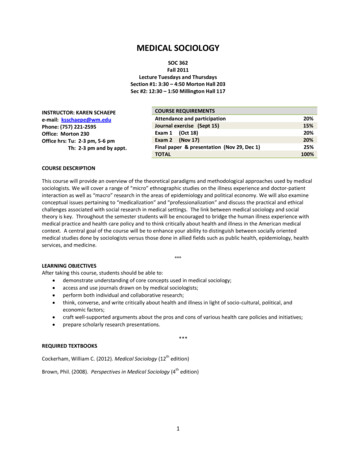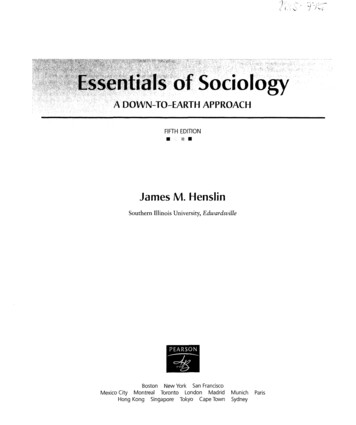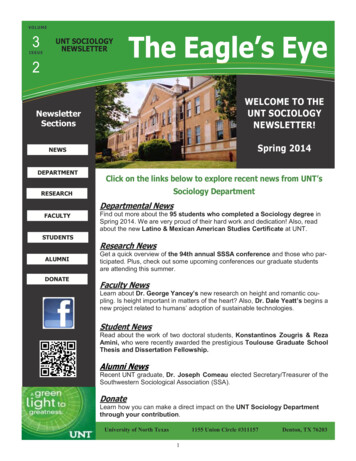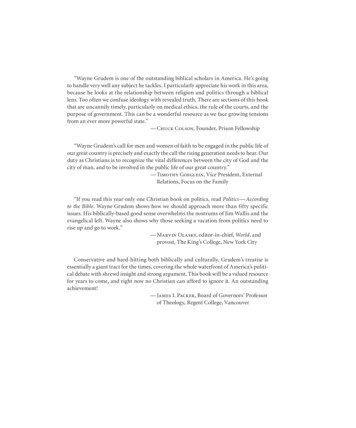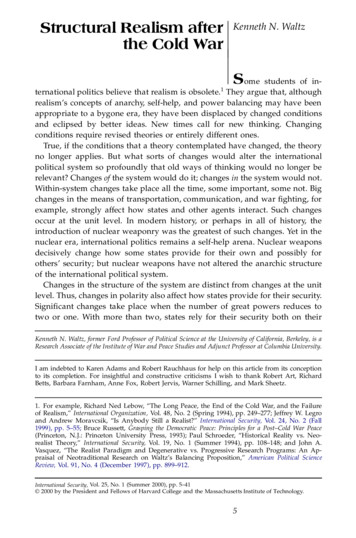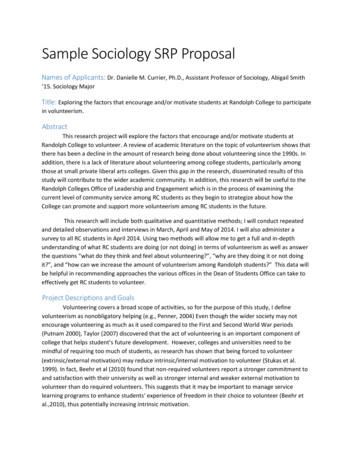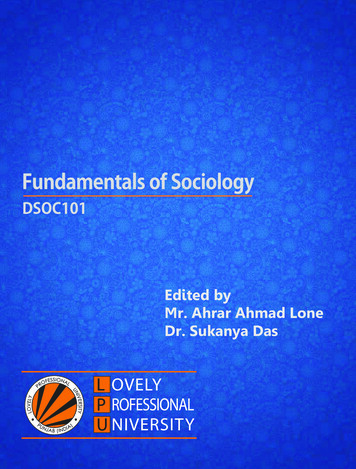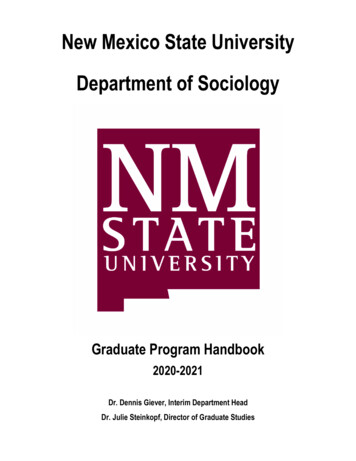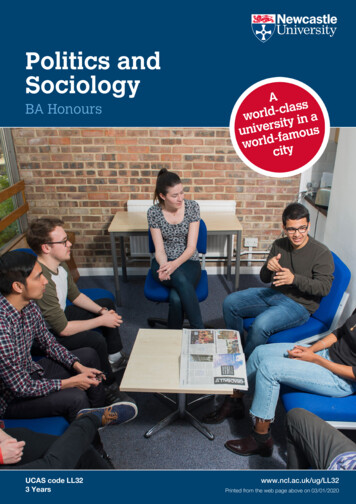
Transcription
Politics andSociologyBA HonoursUCAS code LL323 Yearswww.ncl.ac.uk/ug/LL32Printed from the web page above on 03/01/2020
Politics andSociology BA HonoursUCAS code LL323 YearsWe value learning in partnership with our students. We sharereal-world data in research-informed modules and supportyou to analyse your own material as your skills develop.Political issues are invariably social issues,involving questions of power, inequalities,conflict and change in contemporary societies.Boost your employability with a work placementDividing your time equally between sociology and politics,you develop a rich, in-depth and well-informedunderstanding of the social forces that create and sustainpolitical and social institutions.Optional modules allow you to tailor the degree to suit yourown interests, with topics like: critical international politicspolitical violence and the modern staterefugees and displacementsurban sociologyYour choice of topics is closely aligned to the researchexpertise of our academic staff, allowing you to study at thecutting edge of the discipline with our internationallyrecognised experts.Highlights of this degreeQuality and rankingPolitics at Newcastle is highly regarded: top 200 – Social Sciences category – Times HigherEducation World University Rankings by Subject 2018top 20 in the UK - the Times and Sunday Times GoodUniversity Guide 202090% overall satisfaction score – National StudentSurvey 2019Sociology also ranks highly: top 200 – Sociology category – QS World UniversityRankings by Subject 2018top 200 – Social Sciences category – Times HigherEducation World University Rankings by Subject 2018Study at the cutting edgeThe subject areas of politics and sociology at Newcastleboth have an international reputation for their research.Imagining pasts and futuresPower, inequalities and citizenshipWe also have strong links to the Policy, Ethics and LifeSciences (PEALS) research unit.You will gain independent research experience and dataanalysis skills during your dissertation.Apply to spend 9 to 12 months on anoptional work placement between Stages 2 and 3. Youcan apply to spend your placement year with anyorganisation and will receive University support to do so.You’ll gain first-hand experience of working in the sector,putting your learning into practice and developing yourprofessional expertise.It will extend your degree by a year and is subject toavailability, however it isn't available if you're spending a yearstudying abroad.Find out more about Work Placements.Study abroadYou have the opportunity to broaden your academicexperience by taking part in a study abroad exchange inStage 3 in places such as: DenmarkGermanySwedenNorwayMany of our partner institutions teach in English, so fluencyin the language of your host institution is not essential.We also have links with non-EU universities in Canada,Australia, the US and Singapore.Facilities and supportAt Newcastle, you’ll join a close-knit community of studentsand academics. You will divide your time between Sociologyand Politics, both of which are part of the School ofGeography, Politics and Sociology.FacilitiesYou will have access to modern learning and teachingspaces, in the Politics Building and Claremont Tower, aswell as the award-winning University library.SupportIn politics, our research activity focuses on three overlappingareas:You will have an academic member of staff as a personaltutor throughout your degree. They can help with academicand personal issues. Peer mentors will help you in your first year. They are fellowstudents who can help you settle in and answer anyquestions you have.governance and political organisationsinternational politicspolitical philosophyIn sociology, our research areas include: Identities, embodiments and selvesTake a virtual tour at www.ncl.ac.uk/tour2
Social activitiesYou can join the student-run Politics Society and SociologySociety who organise a busy calendar of events throughoutthe year.Course DetailsAll candidates are considered on an individual basis.If your qualifications are not listed here, please see ouradditional entry requirements web pages to find out whichother qualifications are considered.The entrance requirements below apply to 2020 entry.Stage 1Our multi-award-winning Library has a wealth of studyresources.Compulsory modulesSOC1032 Politics and SocietyPOL1045 Politics: Essential Research Study SkillsOptional modulesYou choose two Sociology modules from the list below:SOC1027 Comparing CulturesSOC1030 The Sociological Imagination: An Introductionto the DisciplineSOC1031 Knowing in Sociology: An Introduction toTheory, Methods and EpistemologySOC1033 Understanding Everyday LifeYou choose two Politics modules from this list:POL1017 Governing Under Pressure: The Politics of theUK and EUPOL1032 Introduction to International PoliticsPOL1046 Order and Disorder: The Shaping of the 21stCenturyPOL1047 Power, Participation and Democracy:Comparative PerspectivesPOL1048 Foundations of Modern Political ThoughtStage 2Compulsory modulesYou take the following compulsory module:SOC2069 Researching Social Life IIf you plan to do a sociology dissertation in your final yearyou also take the following:SOC2070 Researching Social Life IIOptional modulesYou take three modules from the list below.POL2012 Politics of the Middle EastPOL2022 Government and Politics of the USAPOL2034 The Politics and Policy of the European UnionPOL2045 British Politics: State and SocietyPOL2078 Critical International PoliticsPOL2081 Research Methods in Politics**POL2082 Political Violence and the Modern StateTake a virtual tour at www.ncl.ac.uk/tour3
Stage 2Stage 3POL2086 Current Issues in Politics and InternationalRelationsPOL2087 Contemporary Russian PoliticsPOL2088 The Politics of Africa: Africa's Place in GlobalPoliticsPOL2090 Equality, Diversity and Inclusion: Social Issuesin Contemporary Political PhilosophyPOL2096 Politics Work Placement*POL2110 Security StudiesPOL2113 Sex, Gender and Power*Module cannot be combined with NCL2007**Discuss with the Degree Programme Director beforeselecting this moduleYou take two modules from the list below (unless youhave selected SOC2070 above, in which case you takeone module from the list below):SOC2056 Sociology of Health and IllnessSOC2058 Understanding Social Change andTransformationSOC2067 Consumer Culture: An AnthropologicalPerspectiveSOC2071 The Sociology of ChildhoodSOC2084 Social Invention of Central EuropeSOC2085 Refugees and Displacement: Borders, Campsand AsylumSOC2086 Post-disciplinary Criminology: Hermeneutics,Poststructuralism and Cultural TheorySOC2087 Identity and Difference in Multicultural BritainWith approval of the Degree Programme Director, youmay substitute one Politics or one Sociology module forthe following:NCL2007 Career Development for second year studentsCompulsory modulesYou choose one of the following dissertation modules:POL3046 Dissertation in PoliticsPOL3103 Community-Based Research in PoliticsSOC3097 Dissertation in Sociology**In order to take Dissertation in Sociology (SOC3097)students must have completed SOC2070.Optional modulesIf you have selected SOC3097, you'll take three Politicsmodules from the list below.If you have selected POL3046, you will take one Politicsmodule from the list below.POL3059 Democracy and the ConstitutionPOL3079 The Government and Politics of ItalyPOL3092 Political Parties and Elections in the UKPOL3104 The Fall and Rise of ChinaPOL3106 Democracy in Deeply Divided SocietiesPOL3108 The Politics of the Far Right in EuropePOL3109 Gender, Campaigns and MediaPOL3110 International Organisation and DiplomacyPOL3111 UK Parliamentary StudiesPOL3114 Animal and Environmental EthicsPOL3116 The Ethics of WarPOL3117 Politics of ImmigrationPOL3122 The Politics of HappinessPOL3124 Mexican Politics: Authoritarianism andDemocracyIf you have selected SOC3097, you'll take one Sociologymodule from the list below.If you have selected POL3046, you will take three Politicsmodules from the list below.SOC3077 Making People: Anthropology of Belonging,Life and DeathSOC3078 Dreamworlds: Society and the UtopianImaginationSOC3084 Tools of Hope and Despair. Making Sense ofUncertainty and Expectation in SocietySOC3090 Investigating the Body: Sociological Debatesabout the Social, Legal and Creative Management of theHuman BodySOC3091 CSI Newcastle: The Sociology of ForensicSciencesSOC3092 Moral Dilemmas, Judgements and Debates:The Anthropology of Rights and WrongsSOC3096 Educating Inequalities in a Global AgeSOC3098 Community and Conflict in the CountrysideSOC3099 Sociology of Race and EthnicityYou also have the opportunity to spend semester 1 ofStage 3 studying abroad through a study exchange. Youstudy modules that count towards your final degree andbegin work on your dissertation.SOC3085 Student ExchangeWork Placement (optional)You can apply to spend 9 to 12 months on an optionalwork placement between Stages 2 and 3. You can applyto spend your placement year with any organisation andwill receive University support to do so. It will extend yourdegree by a year and is subject to availability. It isn'tavailable if you're spending a year studying abroad. Findout more about Work Placements.Year 3 (Placement Year)On completion of Stage 2 and before entering Stage 3,you may as part of your studies for the degree spend ayear in a placement with an approved organisation. If youare required to re-sit your Stage 2 assessment, you mustdelay the start of your placement until you have done so.If you fail Stage 2, you may not complete a placementyear.NCL3000 Careers Service Placement Year ModuleTake a virtual tour at www.ncl.ac.uk/tour4
Teaching and assessmentTeaching methodsFind out more about the career options for Politics andSociology from Prospects: The UK's Official CareersWebsite.Your work is divided between lectures and seminars, witharound 10 hours a week devoted to large and small groupstudy. You will supplement this with a maximum of 28hours’ private study.Assessment methodsYou will be assessed by a combination of: essaysexaminationsprojectsdossierspresentations and poster presentationsIn Stage 3, you undertake a dissertation in either politics orsociology on your topic of choice.Find out moreVisit our Teaching and Learning pages to read about theoutstanding learning experience available to all students atNewcastle University.CareersWhat our graduates go on to do:employment and further studychoicesSee what our recent graduates went on to do and viewgraduate destinations statistics. These statistics are basedon what graduates were doing on a specific date,approximately six months after graduation. Take a look atthe most recent data available for our graduates.The destination data is available in varying levels, beginningwith the University and moving through Faculty and Schooldown to individual course reports. This final level may giveyou some useful ideas about possible options after yourcourse or a course you are considering.Careers and employability atNewcastleNewcastle University consistently has one of the bestrecords for graduate employment in the UK.Politics and Sociology careersStudying sociology will enable you to develop valuable skillswhich can be applied to many different careers, includingunderstanding how society works and its diverse socialsituations, the ability to analyse complex data, teamworking, and communication skills.Throughout the course you will be encouraged to develop apersonal portfolio of knowledge and skills in a field bestmatching your tastes and abilities. This will provide you withan opportunity to get acquainted with the work environmentin an area of employment of interest to you.Employers recognise that sociology graduates tend to havean interest in dealing with people and this is reflected insome of the types of jobs sociology graduates do.Previous Newcastle University sociology graduates can befound working across the public, private and not-for-profitsectors. Areas of employment include: the Civil Serviceeducationsocial welfarerecruitmentHRcustomer servicesSome graduates will continue to postgraduate-level studies.Popular choices include Master's-level Sociology, thePostgraduate Certificate in Education and law conversioncourses.96% of our 2017 UK-domiciled UG/PG graduatesprogressed to employment or further study within sixmonths of graduating.85.5% of our graduates are in graduate level employment orfurther study within six months of graduating.We provide an extensive range of opportunities to allstudents through an initiative called ncl . This enables youto develop personal, employability and enterprise skills andto give you the edge in the employment market after yougraduate.Our award-winning Careers Service is one of the largest andbest in the country, and we have strong links withemployers.Fees & FundingTuition Fees (UK students)2020 entry: 9,250For programmes where you can spend a year on a workplacement or studying abroad, you will receive asignificant fee reduction for that year.Some of our degrees involve additional costs which arenot covered by your tuition fees.Please note:Take a virtual tour at www.ncl.ac.uk/tour5
Tuition Fees (UK students)Scholarships and Financial Support (EUstudents)The maximum fee that we are permitted to charge for UKstudents is set by the UK government.As a general principle, you should expect the tuition fee toincrease in each subsequent academic year of yourcourse, subject to government regulations on feeincreases and in line with inflation.See more information on all aspects of studentfinance relating to Newcastle University.You may be eligible for one of a range of NewcastleUniversity Scholarships in addition to government financialsupport.Newcastle University ScholarshipsGovernment financial supportTuition Fees (EU students)Scholarships and Financial Support(International students)2020 entry: 9,250 You will pay the same tuition fees as UK studentsfor the duration of your course.For programmes where you can spend a year on a workplacement or studying abroad, you will receive asignificant fee reduction for that year.Some of our degrees involve additional costs which arenot covered by your tuition fees.Please note:As a general principle, you should expect the tuition fee toincrease in each subsequent academic year of yourcourse, subject to government regulations on feeincreases and in line with inflation.See more information on all aspects of studentfinance relating to Newcastle University.We offer a range of scholarships to eligible internationalstudents:Vice-Chancellor's International ScholarshipsVice-Chancellor’s Excellence ScholarshipsVice-Chancellor’s Global ScholarshipsWe also offer International Family Discounts which areavailable for all international students with a close familymember who has graduated from or is now studying atNewcastle University.Newcastle University offers Sanctuary Scholarships foreligible undergraduate students (excludes MBBS andBDS students) from asylum-seeker and refugeebackgrounds.Some of our subject scholarships and sportsscholarships are also available for international students.Tuition Fees (International students)2020 entry*: 18,000*Please note:You will be charged tuition fees for each year of yourdegree programme (unless you are on a shorter exchangeprogramme).The tuition fee amount you will pay may increaseslightly year on year as a result of inflation.If you spend a year on placement or studying abroad aspart of your degree you may pay a reduced fee for thatyear.See more information on all aspects of studentfinance relating to Newcastle University.ApplyApplying to Newcastle Universitythrough UCASTo apply for undergraduate study at Newcastle you mustuse the online application system managed by theUniversities and Colleges Admissions Service (UCAS).UCAS codes for Newcastle University institution name - NEWCinstitution code - N21UCAS buzzwordScholarships and Financial Support (UKstudents)You may be eligible for one of a range of NewcastleUniversity Scholarships in addition to government financialsupport.Newcastle University ScholarshipsGovernment financial supportAsk your teacher or adviser from your school or college forthe UCAS buzzword. You need the buzzword when youregister on the Apply system. This makes it clear whichschool or college you are applying from.All UK schools and colleges and a small number of EU andinternational establishments are registered with UCAS.If you are applying independently, or are applying from aschool or college which is not registered to manageapplications, you will still use the Apply system. You will notneed a buzzword.Take a virtual tour at www.ncl.ac.uk/tour6
Making your applicationOn the UCAS website you can also find out more about: application deadlines and other important datesoffers and tracking your applicationApplication decisions and enquiriesFind out more about our admissions process and who tocontact if you need help with your application.Graduates meeting the Vice-Chancellor.Take a virtual tour at www.ncl.ac.uk/tour7
Newcastle University consistently has one of the best records for graduate employment in the UK. 96% of our 2017 UK-domiciled UG/PG graduates progressed to employment or further study within six months of graduating. 85.5% of our graduates are in graduate level employment or further study within six months of graduating.

